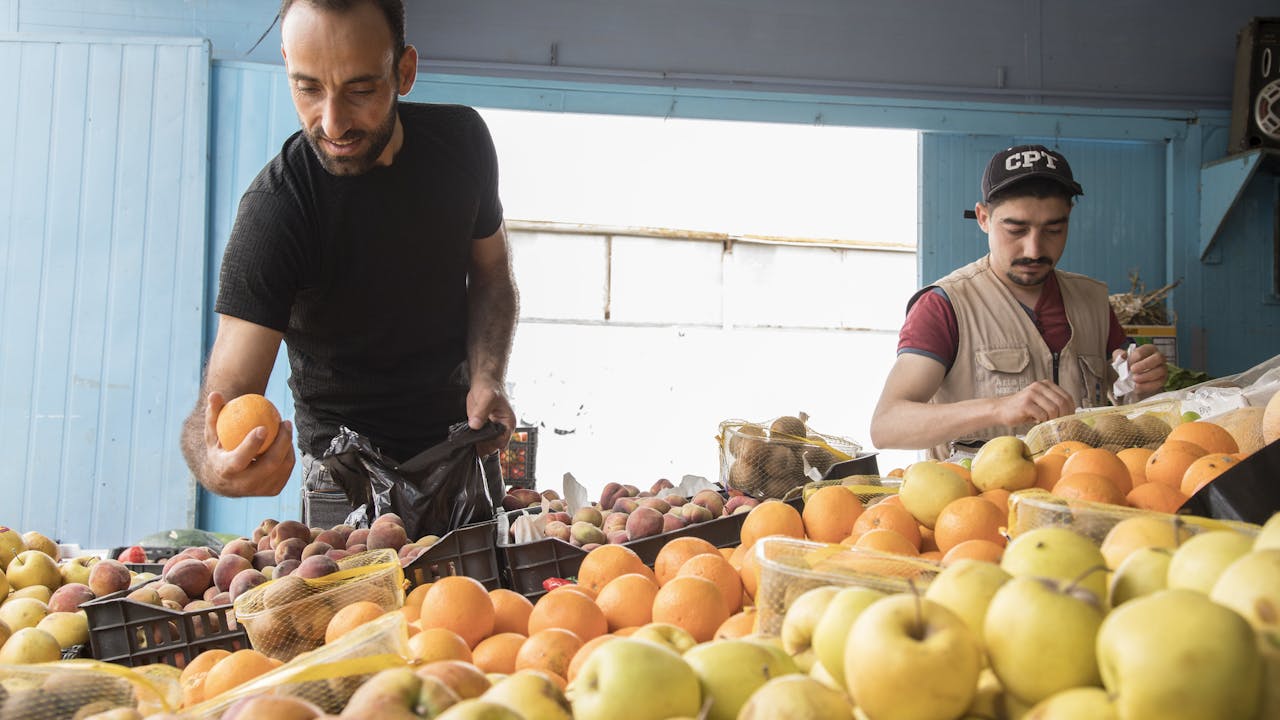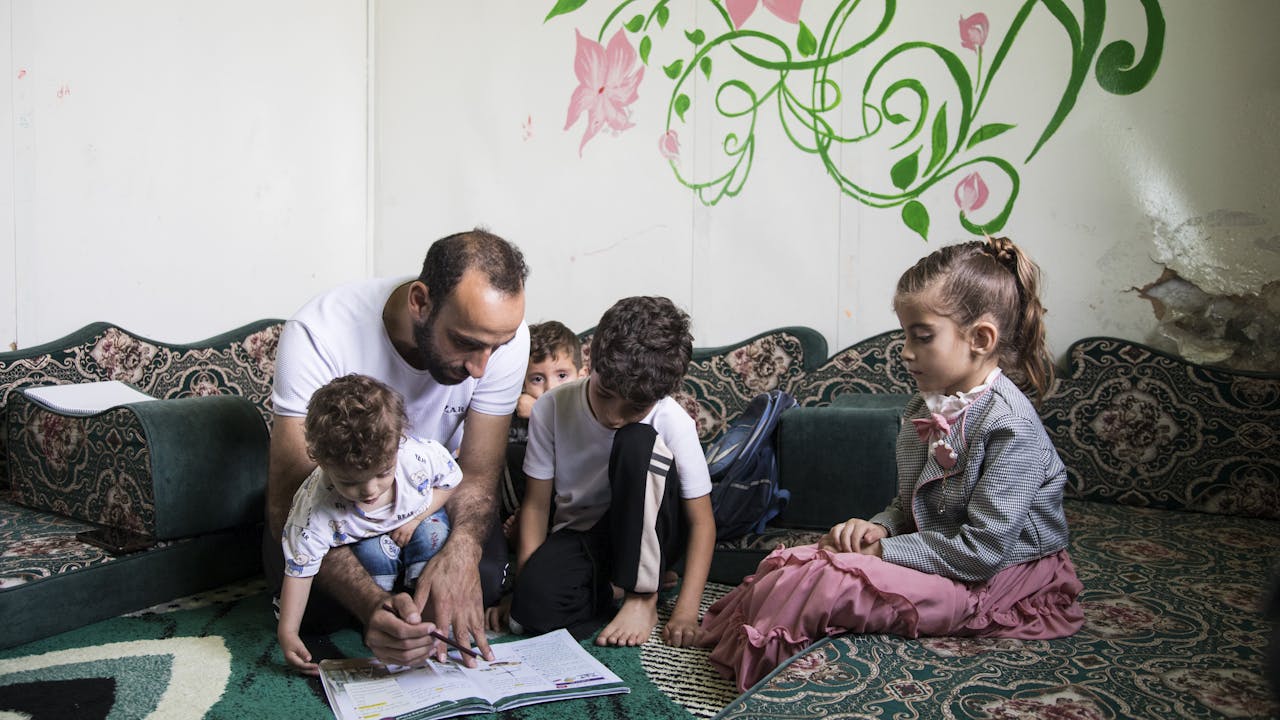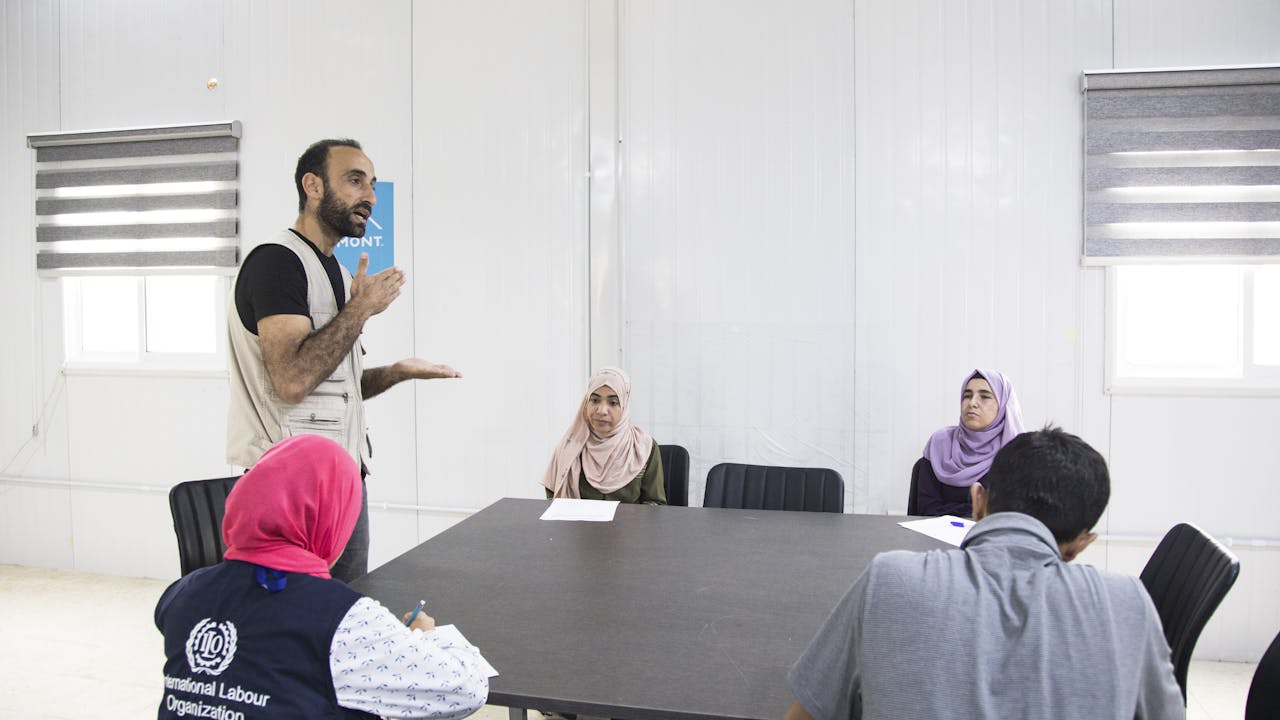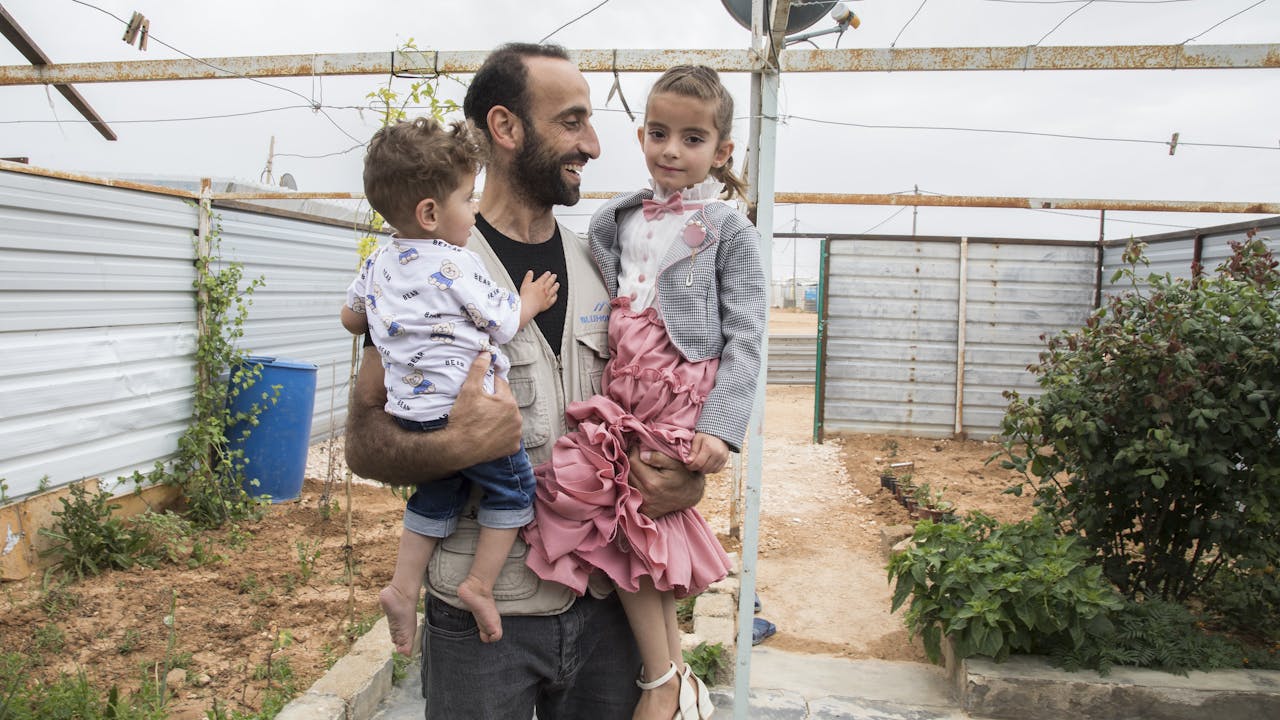When the war started in Syria, we were forced to flee the country because of the danger we faced. The change was momentous.
We used to live a normal family life in a home and moved to life in a refugee camp, where our entire home was one tent. Our whole life became centred on waiting to receive aid.
In the beginning, the camp was just a vast cluster of tents in the desert. We found ourselves living inside what was essentially a piece of cloth. We were exposed to wind and dust, to high temperatures in the summer and freezing temperatures in the winter. Two snow blizzards and windstorms hit the camp while we were still living in tents. Now, we live in converted containers.
All my four children were born in the camp. They saw a house on the internet and were surprised because it had an internal staircase because there is no such thing in the camp.
Living in a camp is a sort of primitive life. There is no electricity, transportation or paved streets. At least, this was the situation in the beginning.
Water was also an issue. Finding drinking water, and water for washing and household use, was difficult.
Another great worry was that we had no source of income. We relied on the aid that was distributed to us, but this was not enough.

Not knowing the people who lived around us was also a source of great concern. We didn’t know where our new neighbours came from. We didn’t know anything about their background or set of beliefs. This was a cause of fear for us.
Another great worry was that we had no source of income. We relied on the aid that was distributed to us, but this was not enough.

I needed to find work so I could get some extra money to overcome daily difficulties.
© ILO/OIT Ala’a Al SukhniI was a teacher back in Syria, working in state elementary schools before and after graduating from university. I also worked as a history and geography teacher in local high schools.
Five days after arriving in the refugee camp, I started looking for work, going to different organizations and looking for jobs as a volunteer. Volunteering allows refugees to work inside camps, performing jobs that would otherwise be closed to Syrians outside of the camps.
I searched the entire camp for an occupation, visiting all the organizations present here, but I didn’t get any positive answers, nor did I receive any help in my initial quest for work. So, I went outside the camp and found a job on a construction site nearby. I also worked in agriculture.
I would still occasionally search for jobs inside the camp. It worked sometimes. I helped people transport and carry heavy items, or I fixed their tents. I needed to get some extra money to overcome daily difficulties and bring home some extra basics like mattresses and sponges.

All four of my children were born inside the camp. My eldest son, Hamza is 7 and attends school in the camp. I help him with his studies.
© ILO/Ala’a Al SukhniI finally found a volunteering position with a humanitarian organization eight months after arriving in the camp. It was the end of an exhausting journey. I was tired of getting unskilled and insecure work like the daily chores I had been doing until then.
The volunteering involved providing psychosocial support to children in the camp, especially to those who did not attend school and went to work instead and faced many risks.
We had to teach them how to protect themselves. I also taught literacy classes. This turned my life from negative to positive. I again became a productive and confident person. I could finally make an impact on other people’s lives again.
Through this position I learned that work is not only measured by the financial return one gets. I started measuring the value of my work by the change I created by helping vulnerable children. Some of them also took me as a role model.
There are many things from this time in my life that I will never forget. For example, there were 14 and 15-year-old children who used to work and could barely read or write, but who became literate after attending my classes.
These were touching moments because I was able to influence them and make a change in their lives, no matter how simple. Without this additional knowledge, their lives would be worse.
I learned that work is not only measured by the financial return one gets. I started measuring the value of my work by the change I created by helping vulnerable children. Some of them also took me as a role model.

I started my collaboration with the International Labour Organization via a three-day training workshop on career guidance services. Following this, colleagues and I took additional sessions on counselling, offered inside the camp.
I joined the project as a volunteer. I was interested in the ILO Job Search Club initiative because I had myself suffered the ordeal of searching for a job inside the camp. The idea of a club to help people find an occupation is a great way to improve the situation on the ground. I wanted to help other people finally find suitable jobs. For me, helping people as a Job Search Club facilitator is a mission.
Looking for a job is an obsession for people in the camp. We continuously need to look for work to exist.
It took me eight months to find my first decent job in the camp. But if one evaluates one’s own skills and uses a specific methodology to search and apply for jobs, such as that used by the Job Search Club, one can save precious time, and it can represent a turning point in one’s life.
The Club helps remove the sense of frustration job seekers might experience, thinking that there are no job opportunities and that they need to fight on their own to develop their skills.

I run career guidance sessions for fellow Syrian refugees on how to find jobs based on their skills.
© ILO/Ala’a Al SukhniToday, we show members of the Job Search Club how to search for jobs, how to recognise their skills, the assets they need to build up to enter the job market, as well as how to set their goals to get the job they want.
We support them in taking the first steps in their job quest, explain how to use their existing network of acquaintances and how to build a new one to get a job. We support them in writing their CVs, distribute them and connect with people.
The idea of a club to help people find an occupation is a great way to improve the situation on the ground. I wanted to help other people finally find suitable jobs. For me, helping people as a Job Search Club facilitator is a mission.

There are two types of job opportunities for people in the camp – professions such as opening and running shops, service maintenance, and providing services such as blacksmiths and carpenters.
The second kind are voluntary jobs with humanitarian organizations, which include training, teaching, and implementing activities and programmes. These are professions that are closed to Syrians outside the camp.
It has been my honour to train with, and also train colleagues from Jordan’s Ministry of Youth, helping young people enter the labour market.

I recently went to Jordan’s capital city, Amman, to run a participatory training session for facilitators and partners of the ILO Job Search Club project at Jordan’s Ministry of Youth.
© ILO/Majdi Abu HadbaToday, when I am not facilitating sessions, I work with a humanitarian organization in the camp as a volunteer and office supervisor. When I return home I play with my children and visit friends and relatives in the camp.
My oldest son is Hamza who is seven years old. I also have Sidra who is five, Zaid who is three, and Muhammad who is just two months old. Hamza is attending school in the camp. If you want to continue with your studies after completing high school, you need to obtain a scholarship, but it is very difficult to get.
We thought we would be able to return to Syria after a short period in the camp. But then days turned into weeks, weeks became months and months became years.
We had to integrate within the new society and had to accept the life in which we lived, coexisting with the other people in the camp and learning how to develop ourselves in our new circumstances.
This country is an honourable one, there is unity. It helped us. Stability is our main dream. Life in the camp is not stable. I wish for a better life and a return to the normal routine I knew before the war, and for my mind to be at peace.

We want to develop, so that our children will live a better life than the one we’ve endured.
© ILO/Ala’a Al Sukhni